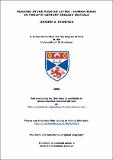Reading in the painted letter : human heads in twelfth-century English initials
Abstract
The thesis examines eight twelfth-century English manuscripts with inhabited initials
occupied by human heads. Such initials, also filled with foliage, struggling humans and
animals, are a pronounced feature of English Romanesque manuscript illumination.
Appearing after the Norman Conquest in manuscripts produced for ecclesiastical
communities as part of the Anglo-Norman emphasis on theological reading, inhabited
initials with human heads are the work of monastic and professional artists. An image
encountered by a monk or a canon while engaged in meditative reading known as the
lectio divina, the head assumes many delightful, evocative and inventive forms in
order to attract the attention of the ruminating reader. The thesis analyses the
application of a human head to an initial and sets initials into a framework of monastic reading in order to suggest ways in which audiences might have read these letters. Exploring the interaction between human heads and their surrounding texts, the thesis examines how inhabited initials function within selected twelfth-century English manuscripts. While some initials have been designed by the artist to hold specific meaning in relation to the text, others allow the reader to invest them with his own meaning. By creating a dialogue with the text that complements the reading process, the human heads in twelfth-century English initials may be regarded as text markers.
Type
Thesis, PhD Doctor of Philosophy
Rights
Creative Commons Attribution-NonCommercial-NoDerivatives 4.0 International
http://creativecommons.org/licenses/by-nc-nd/4.0/
Collections
Except where otherwise noted within the work, this item's licence for re-use is described as Creative Commons Attribution-NonCommercial-NoDerivatives 4.0 International
Items in the St Andrews Research Repository are protected by copyright, with all rights reserved, unless otherwise indicated.


